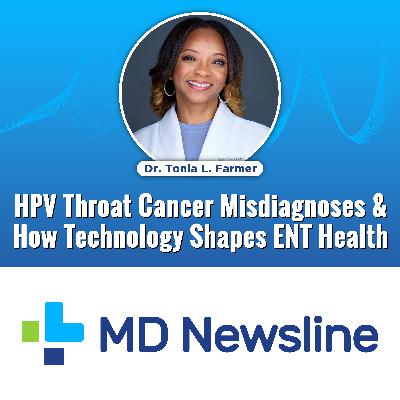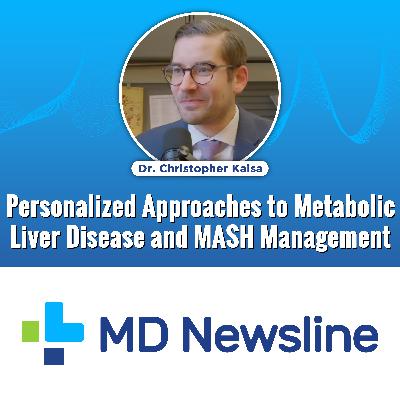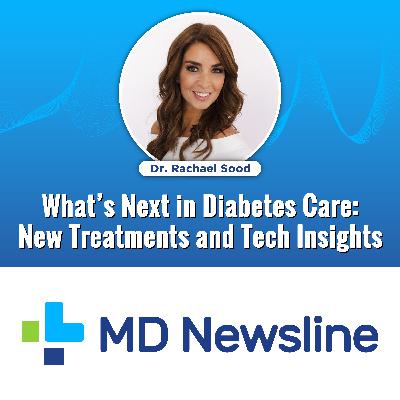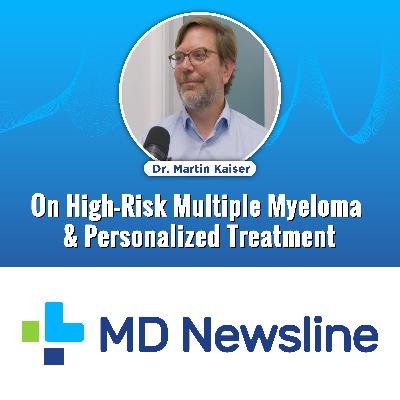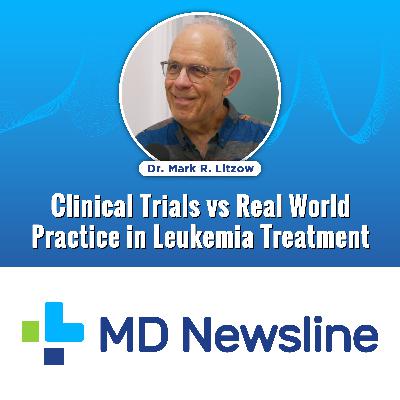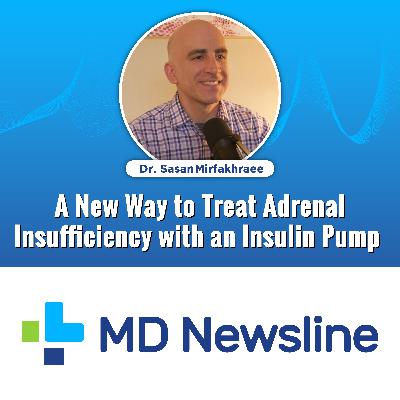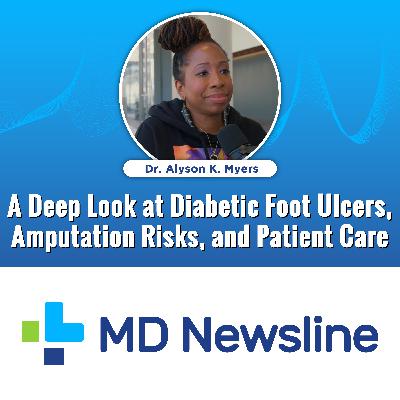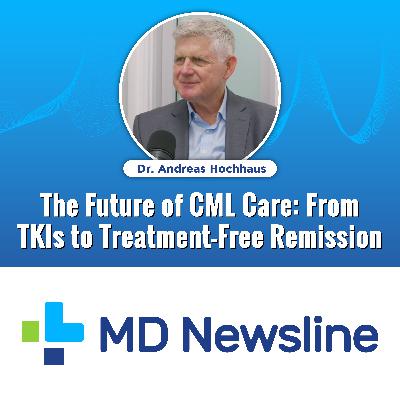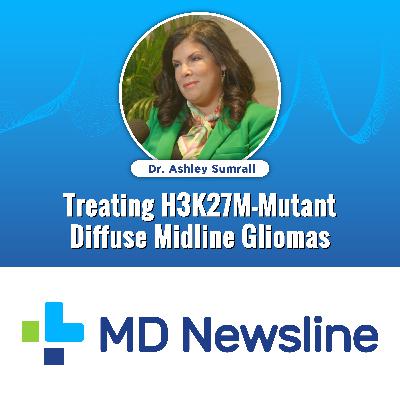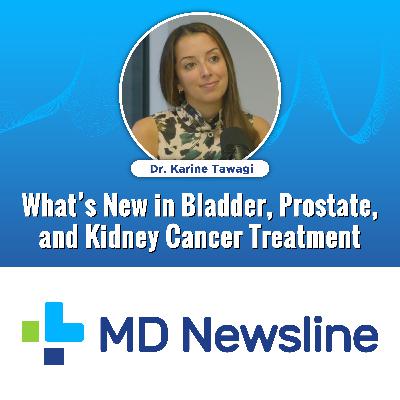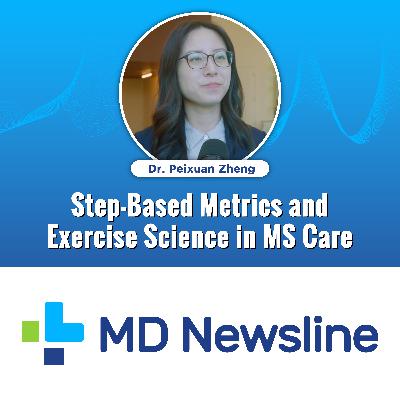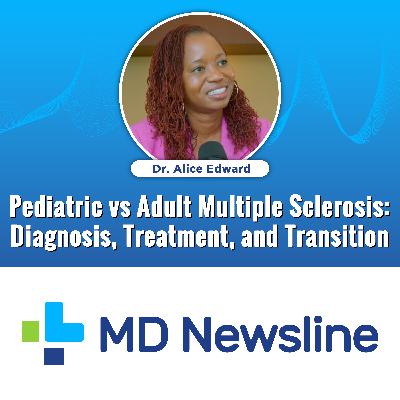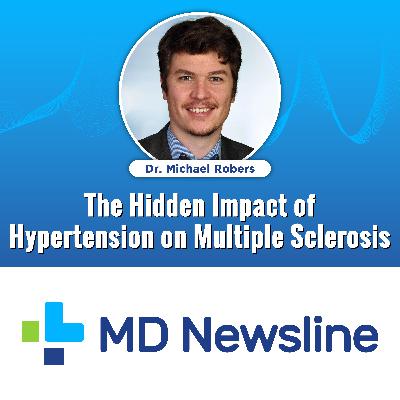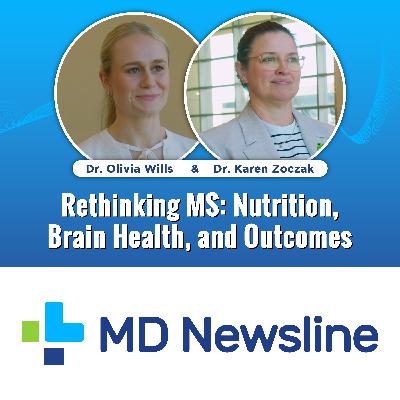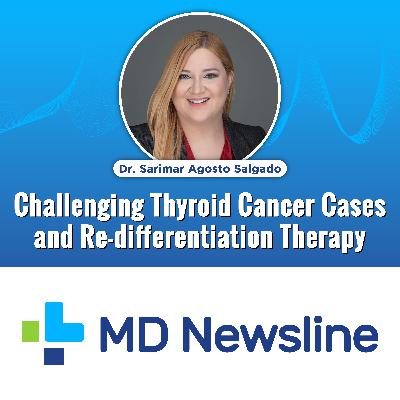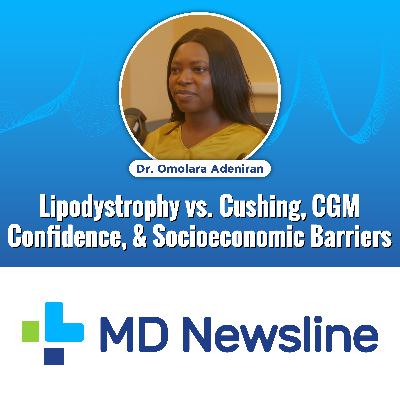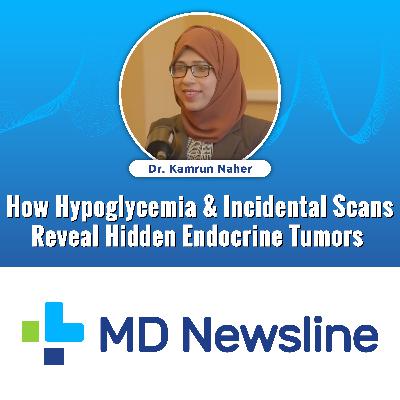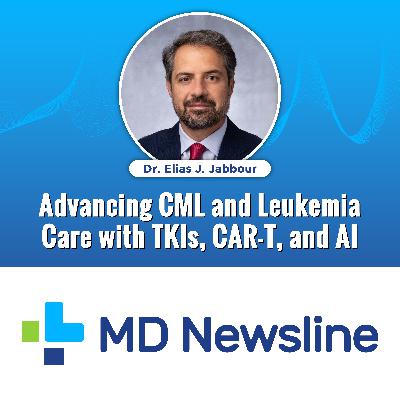Discover MD Newsline
MD Newsline

MD Newsline
Author: MD Newsline
Subscribed: 1Played: 2Subscribe
Share
© 2025
Description
Welcome to The MD Newsline Podcast, where we bring you the latest insights at the intersection of healthcare, equity, and innovation. Join us as we dive deep into the medical breakthroughs, clinical trial updates, and industry best practices shaping the future of patient care.
Each episode features thought-provoking conversations with leading healthcare professionals, researchers, and advocates tackling the biggest challenges in medicine today. From bridging health disparities to optimizing patient adherence, we uncover the strategies and innovations that are transforming the way care is delivered.
If you're a healthcare provider, industry leader, or simply passionate about advancing medical education and equity, this is your go-to resource for expert knowledge and actionable insights. Tune in, stay informed, and be part of the movement toward a healthier, more equitable future.
Each episode features thought-provoking conversations with leading healthcare professionals, researchers, and advocates tackling the biggest challenges in medicine today. From bridging health disparities to optimizing patient adherence, we uncover the strategies and innovations that are transforming the way care is delivered.
If you're a healthcare provider, industry leader, or simply passionate about advancing medical education and equity, this is your go-to resource for expert knowledge and actionable insights. Tune in, stay informed, and be part of the movement toward a healthier, more equitable future.
34 Episodes
Reverse
In this episode of MD Newsline, Dr. Tonia L. Farmer, a board-certified otolaryngologist and head & neck surgeon, discusses the gaps in ENT care, the growing impact of HPV-related cancers, and the importance of education and early detection in improving outcomes—particularly for underserved communities. Drawing from years of practice, Dr. Farmer explores how social, behavioral, and environmental factors shape ENT health and shares insights on emerging research and technologies revolutionizing the field. Episode Highlights Addressing Racial and Socioeconomic Disparities Dr. Farmer highlights the persistent disparities in ENT care, especially among Black patients, who often present with more advanced head and neck cancers. She attributes these gaps not only to mistrust in healthcare systems but also to delayed care-seeking behaviors and limited access to specialists. By increasing community education and early screening, she emphasizes the potential to close these gaps. Lifestyle Trends and HPV-Related Throat Cancers Dr. Farmer discusses the rise of HPV-related oropharyngeal cancers, noting how sexual behavior trends—including unprotected oral sex and multiple partners—have contributed to a surge in HPV-16–linked head and neck cancers. She stresses that while most HPV infections clear naturally, persistent infections can remain dormant for decades, leading to cancer later in life. Her message is clear: education and vaccination are key preventive tools. Recognizing Early Symptoms and Common Misdiagnoses Many patients miss early warning signs of throat cancer—such as persistent sore throat, voice changes, unilateral ear pain, or lumps in the neck. Dr. Farmer explains that these symptoms are frequently mistaken for minor infections or TMJ disorders. She urges primary care providers to be aware of these red flags to ensure timely ENT referrals and faster diagnosis. Emerging Research and Technological Advances Dr. Farmer shares her excitement about ongoing research in oral HPV testing and tinnitus management—including potential implant technologies that could reduce chronic ringing in the ears. She also discusses how robotic-assisted surgery is transforming head and neck procedures and how AI may soon reshape diagnostics and patient engagement. Environmental and Social Impacts on ENT Health Environmental issues, such as air pollution from wildfires, chemical spills, and urban exposure, are increasingly linked to respiratory and sinus disorders. Dr. Farmer notes how such factors exacerbate conditions like sinusitis and chronic throat irritation, especially in vulnerable communities. The Power of Education and Social Media Beyond her clinical work, Dr. Farmer uses social media as an educational platform to spread accurate ENT health information. She believes digital outreach plays a crucial role in combating misinformation, empowering patients, and improving public understanding of ENT health. Key Takeaway Dr. Tonia L. Farmer emphasizes that early education, lifestyle awareness, and preventive care are vital in reducing ENT health disparities. Through research, technology, and public engagement, clinicians can help patients recognize symptoms earlier, make informed health choices, and improve outcomes across diverse populations. Resources Website: https://mdnewsline.com/ Newsletter: https://mdnewsline.com/subscribe/ Connect with Dr. Tonia L. Farmer: Here
In this episode of MD Newsline, Dr. Christopher Kaisa, Assistant Professor of Medicine in the Section of Gastroenterology, Hepatology, and Nutrition at the University of Chicago Medicine, provides an in-depth discussion on Metabolic Dysfunction-Associated Steatohepatitis (MASH) and the evolving strategies for its management. He explains the latest non-invasive diagnostic tools, pharmacologic advancements, and the importance of multidisciplinary care in improving outcomes for patients with metabolic liver disease. Episode Highlights: Patient Populations and Risk Factors Dr. Kaisa describes how obesity, type 2 diabetes, and hypertension significantly increase the risk of developing MASH. He notes that up to 75% of patients with obesity and diabetes may have some form of fatty liver disease—underscoring the urgent need for early detection and intervention. Gaps in Primary Care and Early Detection He discusses existing gaps in primary care screening, emphasizing the importance of education and access to specialized metabolic liver clinics. Early identification of at-risk patients using tools like FibroScan and non-invasive fibrosis scores can dramatically change patient trajectories. Risk Stratification and Fibrosis Assessment Dr. Kaisa details how fibrosis staging correlates with both cardiovascular and liver-related mortality. He explains the use of non-invasive tests (NITs)—including FibroScan and fibrosis scores—to monitor disease progression and therapy response over time. Therapies and Monitoring The episode highlights new treatments, such as resmetirom and GLP-1 receptor agonists (e.g., semaglutide), which have shown fibrotic and inflammatory benefits in clinical trials. Dr. Kaisa explains how these agents are monitored, when to adjust dosages, and how to manage common gastrointestinal side effects. Multidisciplinary Collaboration Dr. Kaisa emphasizes the value of a multidisciplinary team, including hepatologists, endocrinologists, dietitians, and pharmacists, to manage the complex comorbidities associated with MASH. This integrated approach enables personalized and effective care for each patient. The Role of Genetics and Personalized Medicine He also discusses the PNPLA3 genetic variant, a known risk factor among certain ethnic groups, particularly those of Hispanic descent. Recognizing genetic predispositions helps clinicians counsel patients on modifiable risk factors such as diet, exercise, and metabolic control. Clinical Trials and Access to New Treatments Dr. Kaisa explains how clinical trials serve as vital access points for emerging therapies, especially for patients who may not tolerate or qualify for current treatments. He stresses the need to broaden patient participation in research to ensure equitable advancement in the field. Key Takeaway Dr. Kaisa underscores the critical importance of early detection, comprehensive metabolic management, and multidisciplinary collaboration in treating MASH. With the recent FDA approval of semaglutide for MASH, and ongoing advancements in personalized medicine, clinicians have powerful new tools to change the trajectory of this increasingly prevalent disease. Resources: Website: https://mdnewsline.com/ Newsletter: https://mdnewsline.com/subscribe/ Connect with Dr. Christopher Kaisa: Here
In this episode of MD Newsline, Dr. Rachael Sood, a diabetes nurse practitioner and certified diabetes care and education specialist from New Orleans, Louisiana, shares her insights from the 85th American Diabetes Association Scientific Sessions. As the founder of The Diabetes Collective, Dr. Sood discusses the evolution of diabetology—a specialized field focused solely on the identification, treatment, and management of diabetes across all patient populations. Dr. Sood explores how personalized diagnostics, innovative technology, and education-driven care models are reshaping outcomes for patients with type 1, type 2, and prediabetes. She highlights the importance of accurate diagnosis, the role of genetic predisposition, and why clinicians must move beyond relying solely on hemoglobin A1C levels to ensure proper disease identification and management. Episode Highlights Transforming the Diagnosis and Management of Diabetes Dr. Sood explains the principles of diabetology and how it differs from traditional endocrinology. She emphasizes comprehensive assessment, including antibody screening, glucose monitoring, and the integration of genomic insights to accurately distinguish between type 1 and type 2 diabetes. Technology as a Game-Changer in Diabetes Care Dr. Sood shares how continuous glucose monitors (CGMs) and insulin pumps have revolutionized real-time patient engagement. These smart biosensors empower patients to understand how lifestyle, stress, and nutrition directly affect glucose levels, fostering self-awareness and adherence to treatment plans. Overcoming Clinical Inertia and Patient Barriers She highlights the need to address clinical inertia, encouraging clinicians to adapt treatment plans as patients' needs evolve. Dr. Sood underscores the importance of patient education, empathy, and collaboration with family and community networks to improve adherence and reduce care fatigue. Breakthroughs in Treatment and Research Reporting from the ADA conference, Dr. Sood discusses the promising results of Vertex Pharmaceuticals' islet cell therapy, which shows evidence of restoring natural insulin production in type 1 diabetes. She also explains the role of TZLD (teplizumab) in delaying the onset of type 1 diabetes, potentially changing the disease trajectory for high-risk patients. Next-Generation Therapies and GLP-1 Innovation Dr. Sood breaks down the expanding role of GLP-1 receptor agonists—from glucose regulation to benefits in cardiovascular health, weight management, and chronic kidney disease. She reveals data on the new CagreSema combination therapy, which combines semaglutide with an amylin analog, showing over 20% weight reduction and improved metabolic outcomes. Insurance and Access Challenges Dr. Sood addresses the ongoing struggle of insurance coverage, prior authorizations, and high costs for new medications, offering practical advice for clinicians and patients to navigate access through manufacturer programs and cash-based options. Key Takeaway Dr. Sood emphasizes that diabetes care is entering a transformative era—one defined by early detection, patient empowerment, and precision medicine. With new therapies, technologies, and care models emerging rapidly, collaboration among clinicians, patients, and innovators will be essential to achieving long-term success in diabetes prevention and management. Resources Website: https://mdnewsline.com/ Newsletter: https://mdnewsline.com/subscribe/ Connect with Dr. Rachael Sood: Here
In this episode of MD Newsline, Dr. Martin Kaiser, Consultant Hematologist at the Royal Marsden Hospital and Professor of Hematology at the Institute of Cancer Research, London, discusses groundbreaking advances in the diagnosis and management of high-risk multiple myeloma. Drawing insights from the OptiMUM trial and related studies, Dr. Kaiser explores how genetic profiling, long-term treatment intensity, and personalized approaches are transforming patient outcomes. He also examines the challenges of treatment accessibility, the promise of T-cell–based therapies, and the evolving role of AI and MRI technology in hematology. Episode Highlights Understanding High-Risk Myeloma Dr. Kaiser explains that multiple myeloma varies greatly between patients, with high-risk myeloma representing the most aggressive form. Recent progress in genetic diagnostics now enables clinicians to identify these patients more accurately using chromosomal translocations, deletions, and point mutations such as TP53. New Guidelines and Diagnostic Tools He highlights a newly published international guideline that promotes the use of advanced genetic and molecular tools to define high-risk myeloma. This progress allows for more precise risk stratification and individualized care planning. The OptiMUM Trial: Redefining Treatment Duration Dr. Kaiser shares results from the OptiMUM trial, which demonstrated that maintaining treatment intensity beyond the initial six months leads to dramatically improved outcomes—nearly tripling progression-free survival and significantly extending overall survival. He emphasizes that balancing side effects with efficacy is key, and patient feedback plays a central role in long-term management. Inclusivity in Clinical Research The OptiMUM study included 39 hospitals across the UK, including community and rural centers, ensuring that data represented diverse and underserved populations. This broad inclusion provides strong evidence for the real-world effectiveness of intensive therapy. Emerging Therapies and the Future of Care Dr. Kaiser discusses T-cell–based treatments, including CAR-T cells and bispecific antibodies, which are showing remarkable efficacy in relapsed or refractory myeloma. He anticipates their movement into earlier lines of therapy, potentially reshaping high-risk myeloma management in the coming years. Balancing Quality of Life and Long-Term Treatment Sustained therapy requires careful patient–physician collaboration. Dr. Kaiser stresses the importance of listening to patients, managing side effects proactively, and individualizing care to maintain adherence without compromising quality of life. Monitoring and Diagnostics Innovations He describes advances in whole-body MRI and minimal residual disease (MRD) testing, which provide earlier and more sensitive detection of relapse. Combined with regular blood monitoring, these innovations support proactive, precision-guided care. Looking Ahead: AI and Genomic Insights Dr. Kaiser envisions AI-driven imaging and data analysis as the next frontier in myeloma diagnostics. By combining genetic, epigenetic, and imaging data, AI tools could soon enhance diagnostic speed, accuracy, and personalization in clinical practice. Key Takeaway Dr. Martin Kaiser emphasizes that high-risk myeloma care is entering a new era—defined by genomic precision, long-term treatment optimization, and advanced diagnostics. By sustaining therapy intensity and improving diagnostic access, clinicians can achieve longer remissions and better survival outcomes. Collaboration among healthcare systems, researchers, and patients remains vital to ensure equitable access to these life-extending innovations. Resources Website: https://mdnewsline.com/ Newsletter: https://mdnewsline.com/subscribe/ Connect with Dr. Martin Kaiser: Here
In this episode of MD Newsline, Dr. Mark R. Litzow, Professor of Medicine at the Mayo Clinic in Rochester, Minnesota, discusses the groundbreaking findings from the ECOG-ACRIN E1910 trial and the evolving role of immunotherapy in acute lymphoblastic leukemia (ALL). He explores how real-world evidence complements clinical trials, the challenges of standardizing measurable residual disease (MRD) testing, and the future of personalized treatment strategies in hematologic malignancies. Dr. Litzow shares deep insights into how immunotherapy has transformed survival outcomes, how clinicians can balance efficacy and neuropsychiatric side effects, and why cross-disciplinary collaboration is key to advancing oncology care. Episode Highlights Real-World Evidence and Clinical Practice Dr. Litzow explains the growing importance of real-world data in validating and refining clinical trial outcomes. While clinical trials have strict eligibility criteria, real-world settings introduce more patient diversity, offering valuable insights into treatment efficacy and tolerability across broader populations. The ECOG-ACRIN E1910 Trial and Immunotherapy Advances Dr. Litzow details the E1910 trial, which compared standard chemotherapy with and without blinatumomab, an immunotherapy agent targeting CD19 and CD3. The study demonstrated a significant survival benefit—85% versus 68%— for patients receiving blinatumomab, establishing it as a new standard of care for MRD-negative ALL patients. Integrating MRD and Genomic Profiling in Decision-Making He highlights how MRD testing and molecular risk profiling are shaping treatment pathways, enabling clinicians to better identify patients who can potentially avoid bone marrow transplantation through effective immunotherapy. Adapting Pediatric Regimens for Adult Patients Dr. Litzow discusses the use of pediatric-inspired chemotherapy regimens in younger adults and the challenges in adapting these treatments for older or high-risk patients. He emphasizes careful monitoring for toxicities such as hepatic and neuropsychiatric effects. Balancing Treatment Intensity and Quality of Life With immunotherapy showing strong efficacy, Dr. Litzow anticipates future strategies that reduce chemotherapy exposure, lower toxicity, and improve patient quality of life—especially for older adults or those with comorbidities. Future Directions: AI, Cross-Specialty Collaboration, and Inflammation Research Dr. Litzow shares his optimism about artificial intelligence enhancing trial data analysis and calls for cross-disciplinary collaboration between cancer biologists and clinicians. He also emphasizes the emerging role of inflammation in cancer development, urging broader, non-linear approaches to understanding disease mechanisms. Key Takeaway Dr. Litzow underscores a new era in ALL treatment—where immunotherapy, real-world evidence, and molecular diagnostics intersect to personalize care, extend survival, and minimize toxicity. As clinical science evolves, the focus is shifting from intensifying chemotherapy to optimizing immune-based precision therapies that improve both outcomes and quality of life. Resources Website: https://mdnewsline.com/ Newsletter: https://mdnewsline.com/subscribe/ Connect with Dr. Mark R. Litzow: Hera
In this episode of MD Newsline, Dr. Sassan Mirfakhraee, adult endocrinologist and associate professor at the University of Texas Southwestern Medical Center, shares groundbreaking insights into the management of adrenal insufficiency. At the Endocrine 2025 conference, Dr. Mirfakhraee presented his research on utilizing insulin pumps to deliver hydrocortisone—an innovative off-label approach that is showing promising results for patients who remain symptomatic on oral therapy. He explains how this strategy better mimics the body's natural cortisol rhythm, improves quality of life, and reduces ER visits and hospitalizations for patients with persistent symptoms. Dr. Mirfakhraee also outlines patient selection criteria, training protocols, safety considerations, and the potential for remote monitoring via pump data. This conversation highlights the importance of personalized care in endocrinology, bridging innovation with clinical practice to improve outcomes for patients with challenging conditions. Episode Highlights: New Approach to Adrenal Insufficiency Dr. Mirfakhraee introduces the use of insulin pumps for hydrocortisone infusion, addressing limitations of oral steroids that often fail to fully resolve symptoms. Mimicking Cortisol's Natural Rhythm The pump allows for overnight delivery and tailored boluses, reducing symptoms such as dizziness, nausea, fatigue, and morning crashes that patients often face with oral therapy. Patient Selection and Benefits He outlines which patients may benefit most—those with persistent symptoms, frequent adrenal crises, malabsorption issues, or shift-work challenges—while ensuring other conditions are ruled out. Remote Monitoring and Safety Insulin pumps enable cloud-based data sharing, allowing clinicians to monitor dosing, adjustments, and stress dosing remotely. While generally safe, clinicians must remain vigilant for issues like skin infections or infusion interruptions. Training and Quality of Life Through support from diabetes educators, patients learn how to manage pump settings and troubleshoot. Many report dramatic improvements—returning to work, engaging in family life, and regaining independence. Future Research Needs Dr. Mirfakhraee stresses the need for standardized pump settings, broader data collection, and insurance approval pathways to make this therapy more accessible. Key Takeaway: Insulin pump-based hydrocortisone delivery offers a promising new avenue for patients with adrenal insufficiency who remain symptomatic on oral therapy. By improving quality of life, reducing crises, and allowing for tailored dosing, this approach may represent a paradigm shift in endocrine care. Resources: Website: https://mdnewsline.com/ Newsletter: https://mdnewsline.com/subscribe/ Connect with Dr. Sassan Mirfakhraee: Here
In this episode of MD Newsline, we welcome Dr. Emily Zboril, a PhD candidate at Virginia Commonwealth University, to discuss her groundbreaking research on ER-positive breast cancer with bone metastasis. Emily sheds light on the unique challenges of treating this condition, the role of the bone microenvironment, and how novel therapies like lazophoxifene may change the landscape of care. She explains how endocrine therapies currently used to block estrogen signaling often worsen bone fragility, leading to osteoporosis, fractures, and increased metastatic growth. Emily's research investigates lazophoxifene, a compound with bone-protective properties that could not only reduce metastatic burden but also improve patients' quality of life. Her work also highlights the potential of new technologies, including spatial transcriptomics and proteomics, to deepen understanding of the bone–cancer interaction and identify biomarkers for treatment response. With ongoing phase III clinical trials, Emily shares her vision for how lazophoxifene and combination therapies may soon offer more effective, less toxic treatment options for patients living with bone metastasis. Episode Highlights: Bone Metastasis Challenges in ER-Positive Breast Cancer Emily outlines why treating bone metastasis is so complex, particularly due to the impact of estrogen signaling on bone health. Promise of Lazophoxifene She introduces lazophoxifene as a bone-protective estrogen receptor modulator, showing strong results in preclinical models and offering a safer alternative to drugs like tamoxifen. New Technology in Cancer Research Cutting-edge approaches such as spatial transcriptomics and proteomics are helping her team map the interactions between cancer and bone cells, advancing precision medicine. Clinical Trials and Future Directions Emily discusses the ongoing ELANE-3 clinical trial and how results may shape the use of lazophoxifene in both metastatic and adjuvant therapy settings. Key Takeaway: Emily Zaboral's research underscores the potential of lazophoxifene to transform treatment for ER-positive breast cancer patients with bone metastasis by protecting bone health, reducing metastatic spread, and improving survival outcomes. With new technologies and clinical trials underway, the future of care for these patients is moving toward safer, more effective therapies. Resources: Website: https://mdnewsline.com/ Newsletter: https://mdnewsline.com/subscribe/ Connect with Dr. Emily Zboril: Here
In this episode of MD Newsline, Dr. Alyson K. Myers, endocrinologist and Associate Chair for Faculty Mentoring and Community Engagement at Montefiore in the Bronx, dives into one of the most pressing and underrecognized complications of diabetes: diabetic foot ulcers (DFUs) and the devastating risk of amputations. She discusses the intersection of clinical care, social determinants of health, and healthcare disparities, while also highlighting emerging technologies and multidisciplinary clinic models designed to reduce risks and improve patient outcomes. Drawing on her extensive experience in diabetes management and community engagement, Dr. Myers emphasizes both the urgent need for systemic change and the practical tools clinicians can use today to protect their patients. Episode Highlights High Amputation Risk in Diabetic Foot Ulcers Dr. Myers shares sobering statistics, noting that 44% of patients who present with a diabetic foot ulcer undergo an amputation within five years. This reality highlights the urgency of early screening, prevention, and intervention in diabetes care. She stresses that DFUs are not only medical complications but also markers of systemic inequity and missed opportunities for prevention. The Role of Social Determinants of Health Dr. Myers explores how socioeconomic status, racial disparities, and provider bias profoundly shape patient outcomes. In the Bronx and other underserved areas, patients often face delays in diagnosis, limited access to care, and inconsistent follow-up, all of which contribute to worse outcomes. She emphasizes the importance of addressing these systemic barriers alongside clinical treatment. Innovative Technology for Prevention Emerging tools, such as thermal-sensing mats and sensor-equipped socks, offer promising ways to identify foot ulcers before they progress. These devices can detect subtle temperature changes that indicate early tissue damage, allowing patients and providers to intervene earlier. Dr. Myers highlights the potential of technology to improve adherence and reduce disparities by making self-care more accessible. Building Multidisciplinary DFU Clinics Dr. Myers describes the creation of a multidisciplinary DFU clinic in the Bronx, modeled after programs at institutions like Stanford. By integrating endocrinology, podiatry, vascular surgery, infectious disease, and behavioral health, this model ensures that patients receive comprehensive, coordinated care. She explains how this approach can drastically reduce amputation rates and improve long-term patient outcomes. Patient and Caregiver Education Education remains a cornerstone of DFU prevention. Dr. Myers emphasizes strategies such as ensuring patients wear proper footwear, involving caregivers and family members in diabetes care, and simplifying self-care routines. She points out that community-based education and culturally sensitive approaches are essential for building trust and improving adherence. Advocacy and Policy Change Beyond clinical care, Dr. Myers stresses the importance of advocacy and systemic reform. She calls for insurance coverage expansion for proven therapies, including GLP-1 receptor agonists and PAD (peripheral arterial disease) screenings, which can significantly improve outcomes. Her message is clear: reducing disparities in diabetes care requires action at every level—from the exam room to healthcare policy. Key Takeaway Diabetic foot ulcers are a leading cause of amputation, yet they remain preventable with the right tools and care models. Through early detection technologies, multidisciplinary clinics, culturally sensitive education, and equitable access to therapies, healthcare providers can dramatically improve patient outcomes and close persistent gaps in diabetes care. Resources Website: https://mdnewsline.com/ Newsletter: https://mdnewsline.com/subscribe/ Connect with Dr. Alyson K. Myers:LinkedIn
In this episode of MD Newsline, Dr. Andreas Hochhaus, Professor of Internal Medicine, Hematology, and Oncology at the Comprehensive Cancer Center in Jena, Germany, shares his expertise on the evolution of chronic myeloid leukemia (CML) therapies. He reflects on decades of progress in CML treatment, from interferon to targeted TKIs, and highlights the importance of tolerability, patient-centered care, and innovative trial data shaping the future of CML management. Episode Highlights The Evolution of CML Therapy Dr. Hochhaus outlines the transformation of CML treatment, from interferon to imatinib, and the development of second- and third-generation TKIs. He emphasizes advances in efficacy while acknowledging the persistent challenge of drug resistance. Managing Tolerability and Side Effects Toxicities such as cardiovascular, hepatic, and renal complications remain key concerns. Dr. Hochhaus discusses how improving tolerability is central to optimizing patient quality of life. Enliven-01 Trial He highlights the unique pharmacologic profile of Enliven-01, with fewer off-target effects and encouraging safety data, underscoring its potential as a novel therapeutic option. ASCIMINIB as a New Standard Comparing ASCIMINIB with nilotinib, Dr. Hochhaus explains its superior tolerability and efficacy, positioning it as a game-changer in frontline CML therapy. Patient-Centered Care and Future Directions Dr. Hochhaus stresses the importance of shared decision-making, molecular monitoring, and pathways to treatment-free remission, while also pointing to challenges such as additional gene mutations and resistance mechanisms. Key Takeaway The future of CML treatment lies in balancing efficacy, safety, and patient quality of life. With emerging therapies like Enliven-01 and ASCIMINIB, clinicians can provide more personalized and effective care while expanding opportunities for treatment-free remission. Resources Website: https://mdnewsline.com/ Newsletter: https://mdnewsline.com/subscribe/ Connect with Dr. Andreas Hochhaus LinkedIn
In this episode of MD Newsline, Dr. Eleonora Teplinksy, a breast and gynecologic medical oncologist at Valley Health System and clinical assistant professor at the Icahn School of Medicine at Mount Sinai, shares key updates from the ASCO annual meeting. She discusses transformative clinical trials that are reshaping the landscape of metastatic breast cancer treatment across subtypes including hormone receptor-positive, HER2-positive, and triple-negative breast cancer. Dr. Teplinksy highlights the promise of early mutation detection, the potential of antibody-drug conjugates, and the power of liquid biopsies. She also addresses pressing concerns around clinical trial diversity, treatment access, and the need for multidisciplinary care. Episode Highlights: Early Detection in HR+ Breast Cancer: The SERENA-6 Trial The SERENA-6 trial investigates whether switching to camizestrant—an oral SERD—upon early ESR1 mutation detection via liquid biopsy (before radiographic progression) improves progression-free survival. The study showed a 56% reduction in disease progression risk. However, issues around FDA approval, cost, testing frequency, and racial representation remain key concerns. Advancing Triple-Negative Breast Cancer Care: ASCENT-04 The ASCENT-04 trial evaluates sacituzumab govitecan plus pembrolizumab vs. standard chemo-immunotherapy in PD-L1+ patients. Results revealed improved PFS (7.8 to 11.2 months), showing promise for first-line triple-negative treatment, though insurance coverage may delay clinical implementation. HER2+ Breast Cancer Innovation: DESTINY-Breast09 This trial demonstrated that combining T-DXd with pertuzumab improved PFS from 26.9 to 40 months, suggesting a new standard for HER2+ metastatic breast cancer. Still, side effects like interstitial lung disease and lack of clarity on endocrine therapy integration must be addressed. Real-World Barriers: Cost, Toxicity, and Care Access Dr. Teplinksy emphasizes challenges patients face—from time toxicity to insurance denials—and calls for thoughtful side-effect management and patient-centered treatment planning. Multidisciplinary Collaboration and Future of AI in Oncology She underlines the role of interdisciplinary care and the need to bridge gaps across specialties. With AI and machine learning emerging, Dr. Teplinksy envisions more tailored treatments driven by biomarkers and real-world insights. Key Takeaway Dr. Teplinksy stresses the importance of early intervention, clinical trial equity, and multidisciplinary care in improving breast cancer outcomes. As the field embraces antibody-drug conjugates and AI-driven personalization, collaboration and access must evolve in step. Resources Website: https://mdnewsline.com/ Newsletter: https://mdnewsline.com/subscribe/ Connect with Dr. Eleonora Teplinksy: Here
In this episode of MD Newsline, Dr. Ashley Sumrall, a neuro-oncologist and Section Chief at Atrium Health Levine Cancer Institute, shares groundbreaking insights into the treatment of diffuse midline gliomas with the H3K27M mutation. Dr. Sumrall presents data from pediatric and adult studies using Dordaviprone (ONC201), highlighting its promising response rates and tolerability. She also discusses the evolving role of AI in neuro-oncology, the value of multidisciplinary care, and the need for advocacy in biomarker access and healthcare policy. Episode Highlights: Advancements in Treating Rare Brain Tumors Dr. Sumrall introduces updated clinical findings on Dordaviprone for diffuse midline gliomas, a rare and aggressive brain tumor affecting children and young adults. The combined adult and pediatric studies showed a 20% overall response rate and minimal serious side effects, offering a new sense of hope in an area with limited treatment options. Pediatric-Adult Trial Integration She explains the rationale for combining data from adult and pediatric studies due to the rarity of the disease and evolving definitions of pediatric age groups. This integrated approach offers valuable insights into treatment effectiveness across the age spectrum. Promise of AI in Neuro-Oncology Dr. Sumrall emphasizes how machine learning and AI tools like OpenEvidence and ChatGPT can streamline imaging analysis, assist in clinical trial design, and improve diagnostic efficiency. She foresees AI as a co-pilot in tumor boards and day-to-day clinical decisions. Well-Tolerated Therapy and Quality of Life Unlike many cancer treatments, ONC201 demonstrates a low side effect profile, with zero serious adverse events reported. This is especially significant for brain tumor patients who often face limited options beyond surgery and radiation. Biomarkers and Access Challenges She highlights the importance of biomarker testing in classifying tumors and guiding therapy. However, she warns of ongoing disparities in access due to high costs and limited insurance coverage, particularly in community care settings. Advocacy for Research Funding and Access Dr. Sumrall underscores the role of physician and patient advocacy in preserving NIH and NCI funding, expanding access to biomarker profiling, and supporting legislation to streamline patient care. Collaborative Oncology Models She describes her work in multidisciplinary tumor boards and genetic predisposition clinics, where oncologists, geneticists, and endocrinologists jointly tailor proactive care plans—an approach she believes should be the gold standard in oncology. Key Takeaway Dr. Sumrall reinforces that innovation in rare brain tumor treatment must be matched by advocacy, access to biomarker testing, and the adoption of AI-powered tools. The progress with ONC201 offers hope not just in extending life but also in improving the quality of life for patients once left without options. Resources Website: https://mdnewsline.com/ Newsletter: https://mdnewsline.com/subscribe/ Connect with Dr. Ashley Sumrall: Here
In this episode of MD Newsline, Dr. Karine Tawagi, a genitourinary medical oncologist at the University of Illinois in Chicago, shares cutting-edge updates from ASCO 2024 related to bladder, prostate, and kidney cancers. Dr. Tawagi explores the clinical implications of circulating tumor DNA (CT DNA), discusses evolving bladder preservation strategies, and addresses the expanding role of PARP inhibitors in prostate cancer. She also emphasizes the importance of equitable access to new therapies and multidisciplinary collaboration in cancer care. Episode Highlights Advances in Bladder Cancer Management Dr. Tawagi reviews the Niagara study, which integrates dervalumab immunotherapy with standard cisplatin-based chemotherapy. This new regimen has become a standard of care for cisplatin-eligible patients with muscle-invasive bladder cancer. She also discusses ongoing trials and the promise of bladder preservation, especially for patients concerned about quality of life post-cystectomy. The Power of CT DNA in Personalizing Treatment CT DNA is emerging as a powerful prognostic tool in bladder cancer, with potential use in escalating or de-escalating treatments based on molecular response. Dr. Tawagi discusses its role in both neoadjuvant and metastatic settings, including trials like the MODERN study. PARP Inhibitors in Prostate Cancer For prostate cancer patients with homologous recombination repair mutations—especially BRCA1/2—Dr. Tawagi highlights the role of PARP inhibitors such as niraparib and the Amplitude trial's results in the castration-sensitive setting. She discusses the ongoing debate around sequencing, survival outcomes, and access. Kidney Cancer and Immunotherapy An update from the Keynote 564 trial shows continued benefit of adjuvant pembrolizumab for high-risk localized kidney cancer. Dr. Tawagi underscores the importance of patient counseling using risk calculators and timely referral to oncology after nephrectomy. The Importance of Multidisciplinary Care Dr. Tawagi emphasizes collaboration among urologists, radiation oncologists, medical oncologists, and other specialties to deliver optimal, patient-centered care. She calls for increased awareness of trial updates and improved access to novel therapies across diverse populations. Key Takeaway Dr. Tawagi emphasizes that the future of genitourinary oncology lies in individualized treatment informed by biomarkers like CT DNA, equitable access to novel therapies, and strong multidisciplinary collaboration to enhance outcomes and preserve quality of life. Resources Website: https://mdnewsline.com/ Newsletter: https://mdnewsline.com/subscribe/ Connect with Dr. Karine Tawagi: Here
In this episode of MD Newsline, we welcome Peixuan Zheng, an exercise scientist at the University of Illinois Chicago, who shares her research on using step-based physical activity metrics to assess and enhance the daily function of individuals with multiple sclerosis (MS). Peixuan discusses how wearable technology and new step-counting methods—like peak cadence—can provide more accurate insights into patients' real-world mobility compared to traditional clinical assessments. She also dives into her intervention programs combining aerobic and resistance training to support cognitive and physical function in older adults with MS, highlighting improvements in learning, memory, and ambulation. The conversation explores the promise of personalized, at-home exercise prescriptions, the role of motivation in long-term adherence, and how machine learning and advanced wearable sensors could further revolutionize MS care. Episode Highlights Real-World Walking Metrics for MS Patients Peixuan introduces the use of wearable sensors to measure "step-based metrics" like daily steps and peak cadence, capturing real-life walking performance more accurately than traditional lab tests. Reliability of Step-Based Metrics Validated over a six-month period, step-based data showed consistency across time, making it a reliable alternative for tracking changes in mobility outside clinical settings. Home-Based Exercise Interventions Zheng shares results from a 16-week home-based program combining aerobic and resistance exercises aimed at improving cognition and mobility in older adults with MS. Impact on Cognitive Function The intervention led to improved cognitive processing speed and learning/memory outcomes, measured by the BICAMS battery. Role of Motivation and Personal Goals Understanding patient motivations—like walking better or engaging in family activities—helps tailor exercise plans, boosting adherence and long-term outcomes. Machine Learning and Future Applications Zheng sees a future where AI and wearable technology help generate personalized exercise prescriptions based on real-time physiological and movement data. Key Takeaway Peixuan Zheng's research shows that real-world step-based metrics and personalized, home-based exercise programs offer promising ways to monitor and improve mobility and cognition in people with MS. Her work supports a future of MS care grounded in precision, motivation, and multidisciplinary collaboration. Resources Website: https://mdnewsline.com Newsletter: Subscribe to Updates Connect with Peixuan Zheng: Here
In this episode of MD Newsline, Dr. Alice Edward, a pediatric and adult neurologist and neuroimmunology specialist, explores the complex landscape of diagnosing and managing multiple sclerosis (MS) in children. She highlights the critical differences between pediatric and adult MS, including symptom presentation, diagnostic criteria, and treatment strategies. Dr. Edward also delves into the impact of hormonal changes, pregnancy planning, and the challenges of transitioning care from pediatric to adult neurology services. Episode Highlights Pediatric vs. Adult MS Presentation Dr. Edward discusses how children often present with more inflammatory forms of MS and experience more frequent relapses. She emphasizes the brain's plasticity in younger patients, which can sometimes lead to better recovery. Diagnostic Criteria and Challenges She explains the pediatric-specific McDonald criteria and the importance of excluding alternative diagnoses like encephalitis, meningitis, or genetic disorders due to the rarity of pediatric MS. Red Flags and Misdiagnoses Dr. Edward points out clinical signs that may suggest non-MS demyelinating conditions and stresses the importance of early MRI access and parental advocacy. High-Efficacy First-Line Therapy Unlike the step-up approach in adults, pediatric MS often requires starting with high-efficacy disease-modifying therapies (DMTs) to control aggressive inflammation. She explains why escalation therapy is not favored in children. Hormonal and Life Stage Considerations Puberty, pregnancy, and aging play critical roles in MS management. Dr. Edward reviews the latest data on DMT use during pregnancy and postpartum periods, emphasizing preventive planning. The Transition to Adult Care Dr. Edward outlines the need for smoother transitional care and continuity between pediatric and adult MS services. She shares her vision for building a lifelong care model. Cognitive Outcomes and Disease Progression Children diagnosed with MS may face more significant cognitive challenges over time due to longer disease duration. Early and aggressive therapy can mitigate long-term deficits. Key Takeaway Pediatric MS is rare but more inflammatory and demands early, aggressive treatment. Tailoring care throughout a patient's lifespan—including puberty, pregnancy, and transition to adult neurology—is vital to optimizing outcomes and preventing disability. Resources Website: https://mdnewsline.com/ Newsletter: https://mdnewsline.com/subscribe/ Connect with Dr. Alice Edward: Here
In this episode of MD Newsline, Dr. Michael Robers, a neurologist and multiple sclerosis (MS) specialist at Barrow Neurological Institute in Phoenix, Arizona, shares groundbreaking research on the intersection of hypertension and MS. He highlights the high prevalence of undiagnosed hypertension among MS patients and its association with worse physical disability. Dr. Robers also explores systemic care gaps and advocates for a more integrated, whole-person approach to MS care—emphasizing the role of MS specialists in detecting comorbidities early. Episode Highlights: Understanding MS Health Disparities Dr. Robers discusses how Black, Hispanic, and Indigenous Americans face worse MS outcomes compared to white Americans. Contributing factors include underdiagnosis, delayed care, and insufficient screening, particularly for comorbid conditions like hypertension. The Hidden Impact of Hypertension on MS Disability His research reveals that MS patients with uncontrolled hypertension are over twice as likely to require ambulatory aids. Notably, 27% of patients met hypertension criteria via vital signs, while only 7% had formal diagnoses—highlighting a major care gap. Why Awareness Matters Women, younger patients, and those with borderline high blood pressure are more likely to be unaware of their hypertension status. Dr. Robers urges MS specialists to ask simple screening questions and refer patients to primary care, even if they don't manage blood pressure themselves. Collaborating Across Specialties Dr. Robers discusses the growing need for inter-specialty collaboration in chronic disease care, emphasizing how subspecialists like neurologists can identify issues traditionally addressed in primary care. The Path Forward in MS Care He calls for a broader focus on long-term wellness for MS patients—including screening for common but impactful comorbidities like hypertension. Future research may reveal whether proactive control of blood pressure can reduce long-term disability in MS. Key Takeaway: Undiagnosed hypertension is a modifiable risk factor in MS care. MS providers can help bridge a major care gap by screening for high blood pressure—especially in young, female, and underserved patients—to prevent worsening disability and promote holistic patient health. Resources Link: Website: https://mdnewsline.com/ Newsletter: https://mdnewsline.com/subscribe/ Connect with Dr. Michael Robers: Here
In this episode of MD Newsline, Dr. Olivia Wills and Karen Zoczak—accredited practicing dietitians and researchers from Australia—explore the evolving role of dietetics in multiple sclerosis (MS) care. Recorded at a global MS conference, the discussion spotlights the importance of individualized dietary support as part of a comprehensive, multidisciplinary care plan. Dr. Wills and Ms. Zoczak share insights from their latest research and real-world clinical experiences, highlighting how nutrition can improve symptom management, metabolic health, and overall quality of life in people living with MS. Episode Highlights: The Expanding Role of Dietitians in MS Care Dr. Wills and Karen Zoczak discuss how dietetics has grown from a peripheral topic to a respected tool in MS treatment. They emphasize that while diet is not a cure, it is a powerful strategy for improving outcomes and quality of life. Understanding Popular MS Diet Trends The duo unpacks common MS-specific diets like the Swank, Wahl's, OMS, and Best Bet diets—exploring their promises, pitfalls, and nutritional risks when compared to official dietary guidelines. Introducing the MS Diet Risk Tool Karen introduces her soon-to-be-published tool that helps compare various dietary patterns with national dietary guidelines to identify potential nutritional deficiencies and risks. Clinical Red Flags and the Importance of Individualized Nutrition From micronutrient deficiencies (like B12) to fiber intake, the dietitians explain how personalized dietary care can resolve symptoms like neuropathy, constipation, and fatigue while supporting broader brain and metabolic health. Real Patient Success Stories Olivia shares powerful case studies, including a patient who reversed type 2 diabetes markers through nutrition and another who regained mobility and health after recovering from severe malnutrition with dietitian support. Nutrition, Brain Health, and the Microbiome The conversation explores emerging research on the gut and oral microbiome, metabolic comorbidities, and how personalized nutrition could shape lifelong brain health in MS patients. Advocating for the Multidisciplinary Model The episode closes with a call to action for clinicians: refer patients to dietitians early and often to maximize outcomes, reduce risk, and reinforce a unified care strategy. Key Takeaway Nutrition is a critical, evidence-based component of MS care. While it doesn't replace pharmacological treatment, dietetics offers a powerful way to manage symptoms, reduce comorbidities, and improve quality of life—especially when integrated into a comprehensive, multidisciplinary approach. Resources & Links: Website: MD Newsline Newsletter: Subscribe Connect with Dr. Olivia Wills: Here
In this episode of MD Newsline, Dr. Sarimar Agosto Salgado, Oncologic Endocrinologist at Moffitt Cancer Center, shares insights from a panel discussion at the AACE 2025 conference on the complexities of advanced thyroid cancer. She explores case-based approaches to recurrent, radioactive iodine-refractory disease and introduces the evolving strategy of re-differentiation therapy—a promising method for resensitizing tumors to radioactive iodine. Dr. Salgado also highlights real-world challenges including diagnostic errors, late referrals, and the need for greater access to multidisciplinary care. Episode Highlights Understanding Radioactive Iodine-Refractory Disease Dr. Salgado explains that a subset of thyroid cancer patients no longer respond to radioactive iodine due to disease progression. For these patients, careful monitoring, local therapies like SBRT, or systemic treatments become necessary depending on the tumor's growth and location. Re-differentiation Therapy Explained She introduces re-differentiation—a technique using short-term targeted therapy (e.g., BRAF inhibitors) to restore the tumor's ability to uptake radioactive iodine. This allows for additional rounds of treatment and may delay or reduce the need for long-term systemic therapy. The Role of Real-World Data and Registries Because prospective clinical trials remain limited, Dr. Salgado advocates for collecting data through real-world registries and academic collaborations. These efforts may help define optimal timing, predictive markers, and response indicators for re-differentiation therapy. Challenges in Diagnosis and Timely Referral Dr. Salgado reflects on misdiagnosed cases, including rare thyroid variants confused with neuroendocrine tumors. She emphasizes the importance of early referral to expert centers before treatment limits available options. Access and Equity in Advanced Thyroid Cancer Many patients lack access to high-volume thyroid teams, leading to missed opportunities. Dr. Salgado urges clinicians to prioritize expert pathology review, molecular testing, and full-neck imaging to avoid delays in diagnosis and care. Key Takeaway Advanced thyroid cancer is complex and often underestimated. Early referral, precision strategies like re-differentiation, and equitable access to expert teams are critical to improving outcomes and expanding hope for patients with this challenging disease. Resources & Links: Website: MD Newsline Newsletter: Subscribe Connect with Dr. Sarimar Agosto Salgado: Here
In this episode of MD Newsline, Dr. Omolara G. Adeniran, an endocrinologist practicing in Florida, shares her frontline experience addressing the complex realities of diabetes management, technology hesitancy, and healthcare disparities. Drawing on insights from the American Association of Clinical Endocrinology (AACE) conference, Dr. Adeniran discusses lipodystrophy, CGM technology, and how to navigate social determinants of health in real-world patient care. Episode Highlights: Recognizing Lipodystrophy and Treatment Overlap Dr. Adeniran highlights a key learning from the conference—a lecture on differentiating lipodystrophy from Cushing syndrome, a diagnostic challenge due to overlapping features. She shares how improved understanding of this rare condition can lead to significant improvement in comorbidities like severe insulin resistance and hypertriglyceridemia once correctly identified and treated. Breaking Down Technology Barriers with CGMs Continuous glucose monitoring (CGM) remains underutilized due to patient fears and insurance limitations. Dr. Adeniran explains her approach: providing demo models, offering trial periods, and giving reassurance about data privacy to help patients gain comfort with technology and improve their diabetes self-management. Navigating Insurance, Food Access, and Cultural Habits Insurance coverage, food deserts, and cultural food practices remain major obstacles. Dr. Adeniran shares strategies for working with patients in lower-resource settings, including promoting portion control, pragmatic dietary substitutions, and encouraging family involvement in nutrition and care. Engaging Patients in Shared Decision-Making From discussing A1C levels to blood pressure trends, Dr. Adeniran emphasizes making data relatable. She walks patients through lab comparisons over time and links clinical numbers to how they feel—helping them take ownership of their health. Emotional support and patient storytelling help reinforce behavior change. The Power of Listening and Small Steps According to Dr. Adeniran, patient progress starts with empathetic listening. She urges clinicians to hear the small clues that lead to big breakthroughs. Whether managing obesity, thyroid conditions, or diabetes, she believes in celebrating small wins and meeting patients where they are—both medically and personally. Key Takeaway: Effective endocrine care hinges on trust, technology, and tailored solutions. From CGM adoption to dietary adjustments, empowering patients with education and empathy is key to closing gaps and improving outcomes. Resources & Links: Website: MD Newsline Newsletter: Subscribe Here Connect with Dr. Omolara Adeniran: Here
In this episode of MD Newsline, Dr. Kamrun Naher, an endocrinologist based in Brooklyn, shares two compelling case studies that highlight how seemingly psychiatric symptoms and subtle complaints can conceal serious endocrine disorders. She recounts a rare case where suicidal behavior and insomnia led to the discovery of a neuroendocrine tumor in the pancreas, as well as a cluster of unexpected diagnoses of pheochromocytoma—a rare tumor of the adrenal glands. Dr. Naher underscores the need for multidisciplinary collaboration, greater awareness among providers, and earlier patient education to prevent delayed diagnoses and potentially life-threatening complications. Episode Highlights: Unmasking a Neuroendocrine Tumor A patient initially treated for psychiatric symptoms—including depression and insomnia—was ultimately found to have hypoglycemia-induced neuroendocrine tumor in the pancreas. Dr. Naher explains how a cascade of symptoms and an incidental CT scan led to a life-changing diagnosis and surgical treatment. Mental Health vs. Medical Misdiagnosis This case prompts a broader discussion on the importance of not attributing all behavioral health crises to psychiatric origins. Symptoms like insomnia and depression may sometimes be manifestations of metabolic or endocrine issues such as insulin-producing tumors. Pheochromocytoma in the Real World Dr. Naher reflects on a series of pheochromocytoma cases she diagnosed within one month—despite never seeing any during her fellowship. The episodic symptoms—palpitations, sweating, and chest pain—were often dismissed as normal or unrelated. These cases show how pattern recognition and detailed patient questioning can make a diagnostic difference. Preventing Missed Diagnoses Through Simple Questions Dr. Naher advocates for providers to ask patients: "What feels unusual or not normal to you?" This one question, she argues, could bring hidden symptoms to light and lead to earlier detection of rare but serious conditions. Data Collection and Global Awareness She also shares her vision for creating a global hub for rare case data, aiming to gather insight from providers worldwide to better identify trends, recognize genetic syndromes like MEN1, and promote broader awareness. Key Takeaway Not every psychiatric symptom is psychiatric in origin. Early intervention, cross-disciplinary collaboration, and asking the right questions can uncover life-threatening endocrine disorders—and change the course of care. Resources & Links Website: MD Newsline Newsletter: Subscribe Here Connect with Dr. Kamrun Naher: Here
In this episode of MD Newsline, Dr. Elias Jabbour, Professor of Medicine at MD Anderson Cancer Center, shares groundbreaking insights into the evolving treatment landscape of chronic myeloid leukemia (CML), acute lymphoblastic leukemia (ALL), and acute myeloid leukemia (AML). He discusses the transformative role of tyrosine kinase inhibitors (TKIs), strategies to achieve treatment-free remission, and how genetic testing, CAR-T therapy, and monoclonal antibodies are reshaping frontline and relapsed leukemia management. Episode Highlights: The TKI Revolution in CML Dr. Jabbour recounts how TKIs have shifted CML from a fatal disease to one with normal life expectancy, even allowing for treatment discontinuation in select patients after prolonged deep molecular remission. He explains how monitoring and response milestones guide therapy and when mutation testing is necessary. Understanding Resistance and Personalized Care Resistance to TKIs is rare when patients are compliant. Dr. Jabbour outlines how NGS is used to detect kinase domain mutations and guide next-line therapy, particularly in BCR-ABL-independent resistance. He also shares why genomic profiling isn't yet used for frontline CML treatment but may become more relevant in advanced disease. Integrating Immunotherapy in ALL In adult ALL, Dr. Jabbour explains how immunotherapy and TKIs are reducing the need for chemotherapy and transplantation, improving both survival and quality of life. He discusses how CAR-T therapy may move to the frontline setting to shorten treatment duration and potentially eliminate the need for allogeneic transplant. AML: Moving Toward Targeted Frontline Therapy Dr. Jabbour outlines how FLT3, IDH, and menin inhibitors are improving outcomes in AML, especially when combined with hypomethylating agents and venetoclax. He stresses the importance of minimal residual disease (MRD) monitoring to tailor therapy and reduce overtreatment. Overcoming Barriers and Promoting Access He reflects on challenges like drug cost, limited access to specialized care, and clinical trial barriers such as travel and housing. Dr. Jabbour calls for simplified regimens that can be delivered anywhere, so that all patients—not just those at top centers—can benefit from the latest innovations. Key Takeaway: With the right combinations of targeted therapies, immunotherapies, and patient-specific monitoring, many leukemias—especially CML and ALL—are becoming manageable or even curable. But equitable access, affordability, and ongoing collaboration are essential to truly transform care worldwide. Resources: Website: https://mdnewsline.com Newsletter: https://mdnewsline.com/subscribe Connect with Dr. Elias Jabbour: MD Anderson Profile


